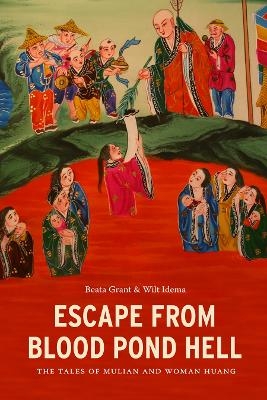
Escape from Blood Pond Hell
The Tales of Mulian and Woman Huang
Seiten
2011
University of Washington Press (Verlag)
978-0-295-99120-7 (ISBN)
University of Washington Press (Verlag)
978-0-295-99120-7 (ISBN)
Provides detailed and powerful descriptions of popular religious beliefs and practices in late imperial China
These translations of The Precious Scroll of the Three Lives of Mulian and Woman Huang Recites the Diamond Sutra are late-nineteenth-century examples of baojuan (literally, "precious scrolls"), a Chinese folk genre featuring alternating verse and prose that was used by monks to illustrate religious precepts for lay listeners. They represent only two of numerous versions, composed in a variety of genres, of these legends, which were once popular all over China. While the seeds of the Mulian legend, in which a man rescues his mother from hell, can be found in Indian Buddhist texts, the story of Woman Huang, who seeks her own salvation, appears to be indigenous to China.
With their graphic portrayals of the underworld; dramatization of Buddhist beliefs about death, salvation, and rebirth; and frank discussion of women's responsibility for sin, these texts provide detailed and powerful descriptions of popular religious beliefs and practices in late imperial China, especially as they relate to women.
These translations of The Precious Scroll of the Three Lives of Mulian and Woman Huang Recites the Diamond Sutra are late-nineteenth-century examples of baojuan (literally, "precious scrolls"), a Chinese folk genre featuring alternating verse and prose that was used by monks to illustrate religious precepts for lay listeners. They represent only two of numerous versions, composed in a variety of genres, of these legends, which were once popular all over China. While the seeds of the Mulian legend, in which a man rescues his mother from hell, can be found in Indian Buddhist texts, the story of Woman Huang, who seeks her own salvation, appears to be indigenous to China.
With their graphic portrayals of the underworld; dramatization of Buddhist beliefs about death, salvation, and rebirth; and frank discussion of women's responsibility for sin, these texts provide detailed and powerful descriptions of popular religious beliefs and practices in late imperial China, especially as they relate to women.
Beata Grant is professor of Chinese language and literature at Washington University, and author of Eminent Nuns: Woman Chan Masters of Seventeenth-Century China and coauthor of The Red Brush: Writing Women of Imperial China. Wilt L. Idema is professor of Chinese literature at Harvard University. His recent publications include Meng Jiangnü Brings Down the Great Wall: Ten Versions of a Chinese Legend and Heroines of Jiangyong: Chinese Narrative Ballads in Women's Script.
Acknowledgments
Note on the Translations
Introduction
The Precious Scroll of the Three Lives of Mulian
Woman Huang Recites the Diamond Sutra
Notes
Glossary of Chinese Characters
Selected Bibliography
| Reihe/Serie | Escape from Blood Pond Hell |
|---|---|
| Übersetzer | Beata Grant, Wilt L. Idema |
| Verlagsort | Seattle |
| Sprache | englisch |
| Maße | 152 x 229 mm |
| Gewicht | 476 g |
| Themenwelt | Geisteswissenschaften ► Geschichte ► Regional- / Ländergeschichte |
| Geisteswissenschaften ► Religion / Theologie ► Buddhismus | |
| Geisteswissenschaften ► Sprach- / Literaturwissenschaft ► Sprachwissenschaft | |
| Sozialwissenschaften ► Soziologie | |
| ISBN-10 | 0-295-99120-8 / 0295991208 |
| ISBN-13 | 978-0-295-99120-7 / 9780295991207 |
| Zustand | Neuware |
| Haben Sie eine Frage zum Produkt? |
Mehr entdecken
aus dem Bereich
aus dem Bereich
Erinnerungen
Buch | Softcover (2024)
Pantheon (Verlag)
CHF 22,40


